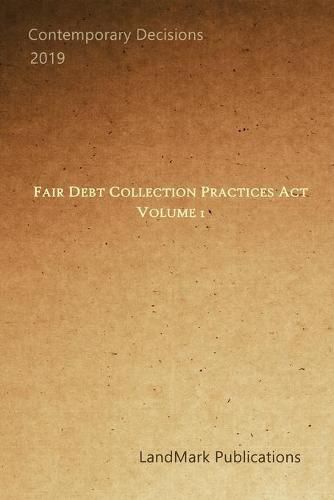Fair Debt Collection Practices Act: Volume 1
Landmark Publications

Fair Debt Collection Practices Act: Volume 1
Landmark Publications
THIS CASEBOOK contains a selection of U. S. Court of Appeals decisions that analyze, interpret and apply provisions of the Fair Debt Collection Practices Act. Volume 1 covers the District of Columbia Circuit and the First through the Fifth Circuit Court of Appeals. * * * Congress enacted the FDCPA in 1977 to eliminate abusive debt collection practices by debt collectors and to insure that those debt collectors who refrain from using abusive debt collection practices are not competitively disadvantaged. 15 U.S.C. 1692(e). It provides a private right of action against debt collectors who violate its provisions. 15 U.S.C. 1692k; see also Brown v. Card Serv. Ctr., 464 F.3d 450, 453 (3d Cir. 2006). As remedial legislation, the FDCPA must be broadly construed in order to give full effect to these purposes. Caprio v. Healthcare Revenue Recovery Grp., LLC, 709 F.3d 142, 148 (3d Cir. 2013). To prevail on an FDCPA claim, a plaintiff must prove that (1) she is a consumer, (2) the defendant is a debt collector, (3) the defendant’s challenged practice involves an attempt to collect a ‘debt’ as the [FDCPA] defines it, and (4) the defendant has violated a provision of the FDCPA in attempting to collect the debt. St. Pierre v. Retrieval-Masters Creditors Bureau, Inc., 898 F.3d 351, 358 (3d Cir. 2018) (quoting Douglass v. Convergent Outsourcing, 765 F.3d 299, 303 (3d Cir. 2014)). […][T]he statute defines debt collector as any person (1) who uses any instrumentality of interstate commerce or the mails in any business the principal purpose of which is the collection of any debts (the principal purpose definition), or (2) who regularly collects or attempts to collect, directly or indirectly, debts owed or due or asserted to be owed or due another (the regularly collects definition). 15 U.S.C. 1692a(6). The statute thus provides two separate paths to establishing an entity’s status as a debt collector. See Henson, 137 S.Ct. at 1721.Barbato v. Greystone Alliance, LLC, 916 F. 3d 260 (3rd Cir. 2019)
This item is not currently in-stock. It can be ordered online and is expected to ship in approx 2 weeks
Our stock data is updated periodically, and availability may change throughout the day for in-demand items. Please call the relevant shop for the most current stock information. Prices are subject to change without notice.
Sign in or become a Readings Member to add this title to a wishlist.


